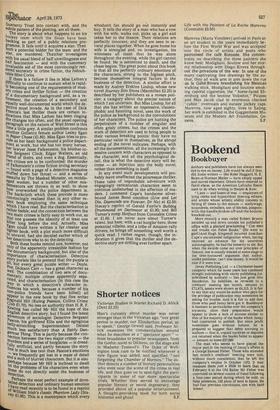Bookend
Bookbuyer
Authors and publishers have not always seen eye to eye on money. Life would be dull if they did. Some writers — like Rider Haggard, H, E. Bates or Norman Mailer — have simply upped and moved elsewhere. Others have resorted to florid abuse, as the American Lafcadio Hearn used to do when writing to Harper & Row: " Liars — and losers of mss. — employers of lying clerks and hypocritical thieving editors, and artists whose artistic ability consists in farting 67 times to the minute — scallywags, scoundrels, swindlers, son of bitches, pisspotsw ith-the-handle-broken-off-and-t he-botto mknocked-out. . ."
More recently a man called Robert Bryans paraded up and down outside his publisher's
office with a placard proclaiming " Con men
and crooks run Faber Books." (He went to gaol.)And Hugh Kingsmill incurred Jonathan Cape's unconcealed indignation when, having received an advance for his unwritten autobiography, he had the temerity to die. But when the swords come out over principles of finance, one is usually treated at some stage to the time-honoured argument that author, unlike publisher, can't lose money. It would be nice if it were true.
Janay Publishing Ltd. — a Chichester-based company which for some years has combined straight publishing with vanity publishing (i.e.
subsidised by authors) — has just gone into liquidation. Its liabilities, as revealed to a creditors' meeting last month, amount to £72,873; assets were shown as £4,215. It is fair to say that any would-be author who pays for the privilege of publication may sometimes be asking for trouble. And it is fair to add that those who paid Janay have got it. Bookbuyer is hesitant to particularise over the company's accounts, since their preparation would appear to show a lack of success similar to that of the majority of the books which Janay had contracted to publish. But since profit sometimes goes without honour, he is prepared to suggest that debts accruing to authors — that is, unpaid royalties or deposits not returned when the books failed to appear — amount to some E57,000.
The man who seems to have played the major part in the running of Janay's affairs is
a George Samuel Fisher. Those who attended last month's creditors' meeting were told, without much consolation, that he left the company's employ in October 1972. It may reassure them just a little to learn that on February 6 at the Old Bailey Mr Fisher was convicted on several counts of fraud following a four-year period during which he sold, on false pretences, 192 plots of land in Spain. He had four previous convictions, one with hard labour.


































 Previous page
Previous page